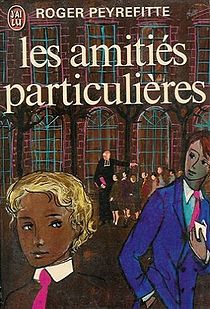
Les amitiés particulières
Encyclopedia

Roger Peyrefitte
Roger Peyrefitte was a French diplomat, writer of bestseller novels and gossipy non-fiction, and a defender of gay rights.-Life and work:...
, probably his best known work today, which won the coveted prix Renaudot
Prix Renaudot
The Prix Théophraste-Renaudot or Prix Renaudot is a French literary award which was created in 1926 by ten art critics awaiting the results of the deliberation of the jury of the Prix Goncourt....
. Largely autobiographical, it deals with an intimate relationship between two boys at a Roman Catholic boarding school and how it is destroyed by a priest's will to protect them from homosexuality.
The book has been translated into English by Felix Giovanelli (1950) and Edward Hyams (1958) both under the title Special Friendships and the latter was reissued in the United States as Secret Friendships. , they are out of print. In 1964
1964 in film
The year 1964 in film involved some significant events.-Events:* January 29 - The film Dr. Strangelove or: How I Learned to Stop Worrying and Love the Bomb is released....
a film adaptation, Les amitiés particulières
Les amitiés particulières (film)
Les amitiés particulières is a 1964 film adaptation of the Roger Peyrefitte novel Les amitiés particulières directed by Jean Delannoy. It starred Francis Lacombrade as Georges, Didier Haudepin as Alexandre and Michel Bouquet as Père de Trennes. It was released in English as This Special Friendship...
, was made, directed by Jean Delannoy
Jean Delannoy
Jean Delannoy was a French actor, film editor, screenwriter and film director.Although Delannoy was born in a Paris suburb, his family is from Haute-Normandie in the north of France...
.
Plot summary
The plot revolves around Georges de Sarre, a fourteen-year-old boy who is sent to a Catholic boarding school in 1920s France. Getting to know the other boys, he is immediately interested in Lucien Rouvière, of whom he is warned by the unsympathetic Marc de Blajan, who cryptically informs him that some of the students "may seem good, but are in fact not". Georges is dismayed when he learns that Lucien already has a boyfriend, André Ferron. He befriends Lucien, but filled with envy, tries to destroy their relationship, eventually succeeding in getting André expelled in a Machiavellian scheme.When his advances towards Lucien remain fruitless, Georges starts a "special friendship", i.e. a friendship with homosexual overtones, with a twelve-year-old student, the beautiful Alexandre (Alexander) Motier. The priests who lead the school disapprove of these relationships, even though it does not go beyond a few kisses and love poems, with no sexual connotation.
Despite their air of condemnation of these special friendships, some of the priests harbour sexual feelings for the boys. One of them, Father de Trennes, likes to invite boys to join him in his room at night for a few drinks and cigarettes. Georges continues his scheming ways and gets Father de Trennes expelled by an anonymous letter. However, Father Lauzon, who is a friend of Alexandre's family and wants to protect him, learns about their relationship and demands that it be ended immediately.
Lauzon talks Georges into giving back the love letters from Alexander, which at the time the novel is set meant that a relationship was over. Unfortunately, Alexander cannot see that Georges was forced to do this and that his feelings for him are actually unchanged—and commits suicide.
The work has been praised for its elegant style, and the discretion with which the subject is treated. One example is the question which Alexander poses to Georges: "Georges, do you know the things one should not know?"
Relationship to Peyrefitte's biography and other similar works
The plot is understood to be largely autobiographical, with de Sarre being Peyrefitte's alter ego in the book. As in the book, Peyrefitte had a relationship with a younger student at a Catholic boarding school and as in the book, his love interest eventually committed suicide.The reader can follow George de Sarre's later life as a diplomat in Greece
Greece
Greece , officially the Hellenic Republic , and historically Hellas or the Republic of Greece in English, is a country in southeastern Europe....
in Peyrefitte's Les Ambassades and La Fin des ambassades, where he also meets Father de Trennes again. Again, this parallels Peyrefitte's life as a diplomat in the 1930s/1940s.
Peyrefitte was on (mostly) friendly terms with Henry de Montherlant
Henry de Montherlant
Henry de Montherlant or Henry Marie Joseph Frédéric Expedite Millon de Montherlant was a French essayist, novelist and one of the leading French dramatists of the twentieth century.- Works :...
, who in his later years wrote a novel (Les garçons, 1969) about a similar relationship. There exists substantial correspondence between the two on, among other things, love for boys and young men.

